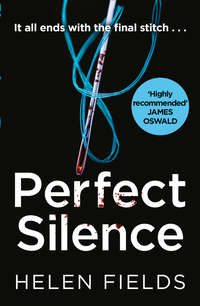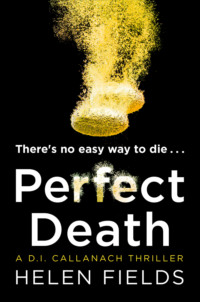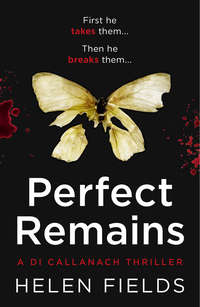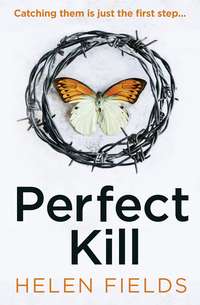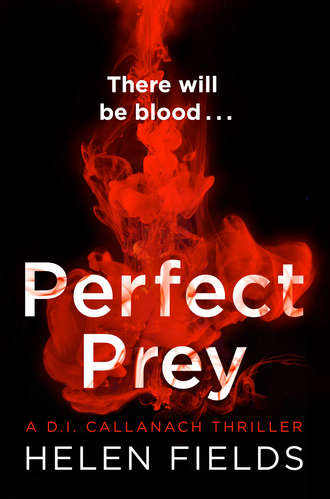
Полная версия
Perfect Prey: The twisty new crime thriller that will keep you up all night
‘I’m not sure this one could be much worse,’ Ava said, rubbing a hand over her eyes.
‘I’m inclined to agree with you,’ Ailsa noted.
‘So no good news at all?’ Begbie asked.
‘In case you hadn’t noticed, I’m a pathologist. When I walk through your door, I’m never bringing good news.’
‘I meant in terms of identifying a suspect,’ Begbie said.
‘It’s someone so physically large that they won’t blend into a crowd, if that helps. And he’d have had her blood, and probably vomit on him as he left. He didn’t leave any clothing or gloves at the scene, so somewhere there is very damning evidence. If you’re willing to risk the public response, you can ask if anyone’s husband, son, brother, landlord, whatever, arrived home stinking, exhausted and bloody on the night in question. I guarantee there’s an evidence trail,’ Ailsa finished.
‘And the festival death?’ Begbie asked, quiet again. He was slumped in his chair, his chin almost to his chest.
Ailsa took another long look at him before answering.
‘Only confirming what you already know. The incision was just above the waistline of his shorts, which were, I think the phrase is, low-slung. He wasn’t wearing a T-shirt, so the flesh was accessible. Incredibly skilled work, if you’ll forgive how extraordinarily distasteful that is as a concept. The attacks are polar opposites of each other. Odd on one night, but isn’t it true that the least likely coincidences are always bound to happen? That one’s going to take some old-fashioned boots on the street police work.’
‘And with one less person than you normally have on your team, Callanach,’ Begbie added. ‘DCI Edgar needs a detective with local knowledge to work with his men. They’re stepping up the investigation since the cyber attack.’
‘Sergeant Lively,’ Callanach responded immediately. Finally Ava gave a tiny smile. ‘He knows the city better than anyone.’
‘He’s also the least tech-savvy member of the squad. Even I’d have more chance of understanding the cyber crime unit briefing than him. I’m moving Max Tripp over. You said yourself you’ve no leads at present. You’re all just sitting around waiting for divine intervention. And Tripp gets all this digital stuff. You can do without him for a couple of weeks.’
‘Sir, not Tripp. He’s a good DC. I need him.’ Tripp was Callanach’s go-to detective constable, arriving early, leaving late, who even managed to signal exhaustion with a bright smile. He was occasionally wearying to be around, but a welcome antidote to the older officers’ cynicism.
‘It’s done, Callanach. Get some results and you can moan to your heart’s content. Under those circumstances I might actually listen. And the media department is up in arms that someone gave a statement to the press yesterday without going through them. Find out who it was and bollock them for me.’
Begbie’s phone rang and as one, they took it as their cue to leave.
Ailsa caught Ava’s arm in the corridor as they were parting. ‘How are you doing, dear?’ she asked.
‘Getting on with it,’ Ava replied.
‘And your parents? I’m dreadful about keeping up with old friends. Not enough hours in the week and all that. You’ll apologise for me, will you?’
‘Not necessary, Ailsa, they know how busy you are. Which is why I’d better let you go.’
‘Forgive me, Ava, but you know how people speculate.’ Ailsa took a step closer, dropping her voice a notch. ‘Your mother has missed several of the clubs she usually attends. Our mutual friends are concerned. Some have contacted me to ask if I know why.’ She let the question hang, her face showing nothing but compassion and care.
Ava wanted to lie, knowing that the truth was the opening of a gate that meant she would have to talk about what was happening to increasing numbers of people. And talking about it meant having to think about it even more than she already was.
‘She has cancer, Ailsa. She’s getting treatment. Everyone has been wonderful.’
‘Poor her,’ Ailsa said softly. ‘And poor you. I won’t ask you any more. Not here. But I’ll be thinking of you all. And if there’s anything I can do …’ she finished.
‘I know that. And I won’t hesitate, I promise,’ Ava said, closing the conversation down as politely as she could.
‘All right then. Now call if you have any questions. And be careful with this case. Whoever killed Helen Lott is operating beyond the extremes of violence that even we are familiar with.’
Ava was dealing with a terrible case, Callanach thought. Close-up police work, dealing with levels of extreme brutality, could be too much for anyone. He pretended to be busy looking through the Sim Thorburn autopsy photos that Ailsa had left for him, but studied Ava peripherally. She was tired and not herself. Her best friend Natasha was away, spending a semester at a university in the States as a guest lecturer. Ava didn’t have her usual support network available and Callanach had been too distracted to notice. If he was honest with himself, avoiding Ava might be closer to the truth. He waited until Ailsa left.
‘We still haven’t christened that fishing rod you gave me,’ Callanach said. ‘When this is over and you and I finally get some time off, how about I take you up on your offer of showing me the lochs?’
‘I’m not sure I can think about that now,’ Ava said. ‘Too much going on.’
‘I understand,’ Callanach said. ‘Then how about a movie tonight? We could both do with thinking about something else for a while.’
A figure appeared beside them. Callanach hadn’t been aware of being watched whilst he’d been talking to Ava, but DCI Joe Edgar had obviously caught the gist of their conversation.
‘That’s nice. Always good to see work colleagues supporting each other. I’m afraid Ava and I are having dinner with her parents tonight though. I haven’t seen Percy and Miranda for years. Can’t wait to tell them what I’ve been up to,’ Edgar said. ‘And I’ve moved that young DC of yours over to my incident room. He’ll do better mixing with my team full-time. He’ll have to buck up though. We keep pretty high standards. Hope it won’t be too much of a shock for him.’
‘He’ll be fine,’ Callanach said, a tiny muscle at the corner of his lower jaw flexing. ‘You shouldn’t underestimate Tripp.’
‘Good, we need them bright and on the ball for the stuff we have to deal with. See you later, darling,’ he said, giving Ava a pat on the shoulder. ‘Callanach,’ he nodded on his way out.
Callanach shoved his hands in his pockets and took a deep breath as he watched Edgar leave.
‘He’s just a friend,’ Ava said, shaking the shoulder Edgar had touched.
‘Dinner with your parents? Thought you couldn’t stand that sort of thing. Or them, for that matter.’
‘What the hell would you know about me and my parents? God, could you just not comment? For once? You know, Luc, you’re the most closed-off person I’ve ever met and you’re lecturing me on my family relationships. You’ve got some nerve.’ She paused, staring at him. ‘I’ve got work to do.’
Callanach stood still until she’d walked round a corner. Keeping a steady smile on his face and his pace measured, he went back to his office and shut his door. Then he slammed one foot hard into the base of his desk. The wood splintered. His toes ached. He grabbed his coat and headed out into the city.
It was a long way to The Meadows from the station but he needed the air.
There was a greater uniformed police presence on the streets than usual. Understandable in the circumstances. Of course, if there was another attack, the chances of the police being in the right place at the right time was still highly unlikely, but people felt better when there were uniforms around. The reality was that for all the protests and outrage, life went on. Though not for Sim Thorburn’s girlfriend, not for a while, anyway. And not for Helen Lott’s extended family, who’d made statements on the news about her terrible passing.
Perhaps the most visual scar left on the city was the graffiti. It had started with one scrawling that an eagle-eyed news reporter had captured the day after the first murder. Callanach made his way to it – a pilgrimage of sorts. Near the centre of the city, where Guthrie Street emerged onto Cowgate, on the curved wall of a hostel in bright blue paint had been left the immortal words, ‘A Charity Worker!’ The fact that the enraged graffiti artist had bothered to punctuate the phrase spoke volumes. The press had embraced the simplicity of expression and adopted the image as their own banner of social indignation.
Sim Thorburn wasn’t a drug dealer who’d sold one tab too many. This was no illegal immigrant with an unpronounceable name, or prostitute long since unrecognisable to friends and family. This was a symbol of Scotland’s heart and soul. The very innocence of the victim was a crime in itself, the press had made that clear. Callanach walked until he found the tag. Below it was the statement, ‘A hospice nurse’, no punctuation this time and the writing was smaller, in red.
From there the copycats had taken over, using the walls in every part of the city to vent their fury at the violation of their peaceful lives. Callanach couldn’t blame them. Such violence was shocking. He’d investigated many terrible cases – child sex trafficking, drugs tested on Eastern European orphans, weapons experiments dressed up as religious wars – they had all come down to money. But this felt like something else. Perhaps just the sheer hell of it. That was what he saw in the words left on the city walls. Futility.
Chapter Eight
At home, a note had been stuck under his door.
‘Knock for me. Made way too much sausage casserole. Will keep it warm. Bunny.’
Callanach contemplated slipping into his apartment silently, before realising he’d spend the whole evening feeling guilty and rude, and opted for the path of least resistance. Bunny opened the door as he was knocking it.
‘Brilliant timing!’ she said. ‘I was just coming to see if you were home yet. Did you get my note? Of course you did, silly me, that’s why you’re here. Come on in. I was opening a bottle of red. Much nicer not to be drinking alone.’
Callanach murmured something noncommittal about how tired he was feeling but by then Bunny was pulling out a chair for him at a small table and putting a glass in his hand. The wine was cheap but drinkable. He was a grape snob – part of the French culture he’d inherited from his mother – but the food smelled good and he was hungry after walking miles around the city.
‘So I finally tidied up, thank goodness. Still got a few boxes to go, but it’s looking more like home. There’s tomato sauce if you want it. I can’t eat without it.’
‘I’ll pass,’ Callanach said. ‘So you’re settling in then?’ he managed, remembering his manners and the need to make small talk.
‘Oh yeah, been at it all day. And I’m having a flat-warming party next Saturday. I can introduce you to my friends. You free?’
‘I’m not sure,’ Callanach said, deciding to be at work whether he was needed or not. ‘I’m pretty much always on call. Never know what’s going to come up. Sounds like fun though.’
‘Oh, but I’ve told them all about you,’ Bunny said, piling more sausages in a beefy tomato sauce onto Callanach’s plate, and telling him every detail of her best friends’ lives as they made their way through dinner. ‘God, I nearly forgot. Some woman was at your door earlier. I did wonder what was going on, as she didn’t knock or anything, just stood there like she was trying to figure something out. She jumped a mile when I put my head out.’
Callanach’s stomach tensed. He put down his fork. If Astrid had reappeared he’d have to move. There was no way he could face being constantly followed again.
‘Did you catch her name?’ Callanach asked Bunny.
‘She didn’t really say much. Muttered something about how it wasn’t important. She’d see you tomorrow.’
‘Can you describe her?’ Callanach asked.
‘Sure, average height, longish brown curly hair. Grey eyes. Size eight to ten. I was wondering if it was your girlfriend.’
‘I don’t have a girlfriend,’ Callanach said, regretting the admission as soon as he’d made it.
‘I’m single, too,’ Bunny said, holding out her glass to be chinked. ‘That’s good. We can keep each other company.’
‘I should find out who that was at my door,’ Callanach said, already sure it was Ava and wondering what had prompted the visit. ‘But thank you for dinner, although you shouldn’t have worried about me.’
‘Oh, it’s no bother. We should make it a regular thing.’
‘I’m out a lot,’ he said. ‘Regular doesn’t work for me. I’ll bump into you occasionally though.’ Bunny’s face dropped and Callanach felt clumsy. He could have been kinder about it, not that kindness was necessarily the best way to put women off.
Back in his flat, he checked his mobile for messages. There was nothing. If Ava had been calling round about an urgent police matter she’d have left a text or voicemail. He glanced at his watch. Presumably she’d be at dinner with her parents and Joe Edgar by now. Still, Callanach thought, if she’d come looking for him it must have been important. He kicked off his shoes and dialled her number.
Her mobile rang only twice before she answered. He could hear conversation in the background, and a distant high-pitched voice making their disapproval of the fact that she was taking the call obvious to everyone.
‘Turner,’ Ava said. ‘Hold on please.’ A door closed and footsteps echoed on wood.
‘Ava, it’s Luc,’ Callanach said. ‘Is everything okay?’
‘Everything’s fine,’ she was terse. ‘Has something happened I need to know about?’
‘No,’ Callanach felt like he was treading through mud. ‘I just …’
‘Oh, right, the girl told you I’d been round,’ Ava said. ‘It was nothing. Just wanted to have a word with you about …’ she paused momentarily, ‘the Chief. I’m worried about him. Nothing that can’t wait until I next see you.’
‘Was that it?’ Callanach asked. ‘Sorry, I went to The Meadows to walk the scene again.’
‘No need to explain, and I apologise if I made things awkward with your neighbour. She told me she was waiting for you to get home for dinner.’
Callanach rolled his head backwards from one shoulder to the other.
‘She just moved in. I think she’s lonely. I really don’t …’
‘Well, I’m at my parents as you could probably hear, so I can’t chat. Catch you soon.’ Ava hung up. Callanach threw his phone onto the sofa and poured himself a more palatable glass of wine.
‘Fuck,’ he said, stripping off his suit and going to shower, running the water as hot as he could bear and climbing in with his glass still in hand, held just out of the stream.
He should have been able to walk away from work and relax. He wound back the clock inside his head and replayed memories of easier days in Lyon. He’d lived in an apartment he’d loved, with a terrace overlooking the park near Interpol’s headquarters. There had been girlfriends. Not that he’d flitted from one to another, but always someone to share a good meal, to hop in a car for a weekend away, to travel to the coast and waterski or sail. And there had been sex. Not like his early twenties when the fever to sleep with women had, at times, consumed him. When he’d used his model looks and intellect to charm and then entice any woman he’d wanted. Easy sex, without the emotional noose that tightened when he thought about it now. Astrid Borde and her false accusation of rape had finished him, both as an Interpol agent and as a man.
He turned his face up into the steaming spray of water and slid a hand down to his penis, willing it hard, trying to remember the last time he’d been with a woman. He conjured images of days and nights he’d spent intent on nothing but physical pleasure – sex on sand dunes, in planes, on boats, in hotels across the world. But now there was nothing. It was as if the muscle he’d once taken so much for granted had simply ceased to exist, leaving a useless flopping length of pitiful flesh to taunt him.
Then there was a flash of another face in his mind, a woman he’d tried not to think about. With it came the jolt of a feeling he’d all but given up on, his muscles performing no more than a spasm in his hand, a quickening inside before it evaporated.
Callanach grabbed the handle of the shower door, squeezing the metal as if he could crush it, growling aloud with the effort of trying to drag the life back into himself. But it had gone. That fleeting hope that he could be normal again.
‘Merde!’ he shouted, smashing a fist into the shower glass, getting nothing in return except bruised knuckles and a dull thud. ‘Je suis pathétique.’ He reverted to French as he always did when he lost control, although the message was the same in any language. He was pathetic. But his muscles had flared into life, if only for a second. It was proof, as if he’d needed it, that there was no physical damage. ‘Enough,’ he said, snatching a towel and throwing it over his shoulders.
As he walked through his bedroom, he paused to stare in the mirror. He was still in good shape, rarely going more than two days without punishing himself at the gym, naturally eating cleanly, always aghast at the piles of chips, pastry and white bread that seemed to flow through the doors of the station. He hated to feel bloated and heavy. His mother had lectured him about diet from before he could talk back. Fruit, vegetables and protein. Everything else was just excess. She’d long since stopped lecturing him. Had not communicated with him at all since his brief spell of incarceration before he’d been bailed pending trial. He got his olive skin from her, and his dark hair. No matter how long he lived in Scotland, his skin was never going to pale enough for him to pass as a native. It was as if his father’s Scottish genes had passed him by.
He ran a hand through his hair, pulling his shoulders back and inspecting his muscle tone as if he were buying a piece of meat. He’d let his head rule his body for too long, trying everything except therapy, save for those few embarrassing obligatory sessions with the Interpol psychologist before he’d served his notice.
Determined to move on, he opened his laptop and skipped through a variety of websites until he found one that looked vaguely professional, then he pulled his wallet from his jacket. In less than a minute he’d purchased a drug without prescription and left his credit card details online. It wasn’t clever but it wasn’t going to get him in serious trouble, even if he was caught. What worried him more, having finally made the choice to buy the drug that might offer him relief, was finding someone with whom he could use it.
Chapter Nine
Three weeks had passed since Sim Thorburn’s murder. Twenty-one days when each morning was marked by the increasing quietness and frustration of Callanach’s team. Today the atmosphere was different. Not in his incident room, but certainly across the hall. A body of men and women was massing at the station. The way they were dressed and the palpable excitement could mean only one thing. Callanach realised they were on a pre-raid briefing. DC Tripp caught his eye, and Callanach managed a nod in response before his purloined detective constable looked back at the whiteboard where DCI Edgar was pointing at the blueprint of a building and barking instructions. However much money the hackers had stolen, or ‘relocated’ as The Unsung had released a statement to explain, was enough to justify a huge public expenditure to ensure they were caught. Callanach wondered what the difference in governmental financing was between the hackers’ case and his investigation into Sim’s murder. Probably best not to know, he thought. That way lay only bitterness and disillusionment.
He had begun to accept that the trail to Sim’s killer had run from lukewarm to cold. It seemed more likely than ever that it was just some random attack, perhaps mistaken identity, perhaps someone Sim had crossed unknowingly. Since the funeral, his girlfriend had left Edinburgh and returned to her parents’ house in Newcastle, leaving only a forwarding address and a message to say how disappointed she was that there had been no progress. Callanach could sympathise.
Since then, he’d lost two more squad members to an attempted rape outside a nightclub, and even Begbie hadn’t asked for a progress report for a couple of days. Callanach watched as DCI Edgar’s team trotted out of the incident room and down the corridor like an army squadron given the go for a secret mission, albeit carrying warrants and laptops instead of guns. Tripp looked half-embarrassed, half-bored as he kept pace in the line towards the stairs.
‘Sir,’ Salter said, coming up behind him. ‘We’ve had this passed on from the uniformed team on duty. An elderly gentleman, missing all night. Wife is distraught. He’s never failed to come home before.’
‘The Major Investigations Team is doing missing persons now, is that right?’ Callanach sighed.
‘Seems likely to be more than that. His mobile and wallet have been found on a park bench on top of a pile of books. Name is Michael Swan. This morning he missed a community awards ceremony. He was due to be recognised for the child literacy programmes he’s set up across the city. Wife said he’d been looking forward to it for weeks.’
‘Sounds more like he’s had a breakdown and run away. Come on then, Salter. That’s if DCI Edgar has left any vehicles for the rest of us.’
They headed east across the city towards Craigentinny golf course. The expanse of greenery would have been visible from Michael Swan’s bedroom window, Callanach realised, as his wife described how her doting husband had always dreamed of retiring next to a golf course. Ironically, he’d then become so consumed with what began as a part-time librarian’s post that he’d barely picked up a club since.
‘Has he been unwell, or acting out of character at all, Mrs Swan?’ Salter asked, sipping the coffee that had appeared courtesy of an adult daughter who was comforting her mother.
‘No. My husband was a creature of habit. He came and went at certain times. Had clothes for work and clothes for the weekend. He always told me if something was bothering him. And I could tell, you know. It’s like that once you’ve been married long enough. But to leave his wallet and phone in a public place? He’d never be so careless.’ The daughter handed her mother more tissues from the box rapidly being used up and Callanach checked his watch. The library wasn’t normally open until later but the caretaker had agreed to meet them there and open up. If Michael Swan had left a note anywhere, it was likely to be on his desk.
At the library it was confirmed that Michael Swan had checked out with his swipe card at 8.37 p.m. the previous day. Salter immediately radioed through to the station for a CCTV check of the route he’d have taken to the point where his wallet and mobile had been abandoned. Callanach moved forward at the caretaker’s beckoning and looked through the documents left on a modern reception desk.
‘Is this where Mr Swan would have spent most of his time?’ Callanach asked.
‘Aye, here to check books in and out. The building is on two levels. Library down here, meeting rooms upstairs, used for educational programmes and whatnot. Sometimes authors come here to talk about their books. Other evenings it’s used for community meetings, you know, the local historical society, a dieting club,’ the caretaker leaned down to whisper in Callanach’s ear, ‘and the local alcohol and drug addiction service is in on a Wednesday, but we’re not supposed to talk about that. Bit sensitive for those attending, you know.’
‘And this is everything? He has no employee locker, no personal area?’ Callanach asked.
‘There’s a little staff area behind that glass there. Used for administration, but also for coats, mugs, a place to concentrate without being pestered.’
The caretaker unlocked another door into a thin room at the side of the main library hall, half wall and half obscured glass, with desks lining one side, and full of the sort of mess that busy, hard-working people leave in their wake.


